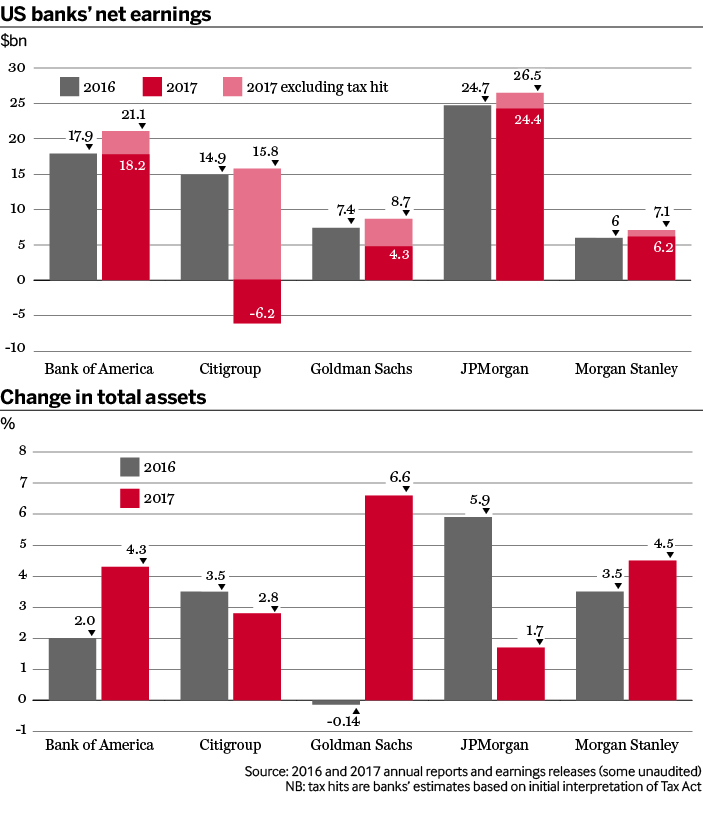One-time losses caused by new legislation should not detract from otherwise record results from the US’s leading firms. Danielle Myles analyses the data.
It has been a case of short-term pain, long-term gain for shareholders in US banks. The largest Wall Street firms recorded multibillion-dollar charges in their fourth-quarter 2017 earnings, caused by the country’s new tax code that was signed into law late last year.
Going forward, the biggest US tax overhaul in three decades will prove a coup for the country’s lenders. By slashing the corporate rate from 35% to 21% it will cut their annual tax bill and boost US business activity. But those benefits will only materialise from the start of 2018, when the law took effect.
The 2017 losses were due to accounting technicalities that required banks to treat their deferred tax assets – essentially tax overpayments – and earnings lodged overseas in accordance with the newly enacted (albeit not in effect) law. It created a $34bn tax hit shared among the US's five leading banks. If it weren’t for this, all would have increased their net earnings on 2016.
Profit drivers
JPMorgan recorded a net income of $24.4bn. Excluding its $2.4bn tax charge, it would have posted its – and likely the US banking industry’s – biggest ever profit. The bank retained its top spot in the annual investment banking league tables, despite its fourth-quarter fixed-income trading revenues being 27% lower than the same period in 2016. In the last three months of 2017, its commercial bank and asset and wealth management division recorded their highest ever revenues.
Despite taking tax hits, Bank of America (BofA) and Morgan Stanley still managed to grow net earnings between 2016 and 2017. If not for the law change, both firms would have increased profits by a whopping 18%. Morgan Stanley reported revenue and pre-tax income growth across all segments, and its fourth-quarter wealth management revenues were its highest to date.
The new law hit Citi the hardest. The bank’s $22bn tax charge resulted in a net loss of $6.2bn – its first in nearly a decade – and shaved $6bn off its common equity Tier 1. CEO Michael Corbat stressed these one-off items did not change Citi’s July 2017 promise to return $60bn in capital to shareholders over the following three years, and that tax reform strengthens the bank’s capital generation capabilities going forward. But for the tax hit, annual profits would have been 6% higher than in 2016.
But for its $4.4bn tax charge, Goldman Sachs would have posted $8.7bn net earnings in 2017. This was driven by the investment bank, which generated its second highest net revenues ever, and debt underwriting revenues, which hit a record $2.94bn.
Asset expansion
Statistics suggest this improved profitability is down to growth rather than the banks trimming down their balance sheets. Total assets at all five banks expanded between 1.7% and 6.6% in 2017. JPMorgan saw the smallest uptick in percentage terms, but given it is the world’s fifth largest bank by assets (according to The Banker’s latest Top 1000 ranking) there is a natural ceiling to its growth.
BofA’s growth accelerated to 4.3% in 2017, adding some $93bn to its asset base. Morgan Stanley’s and Citigroup’s assets have edged up in recent years, although the latter is still some 15% smaller than in 2007.
Meanwhile, Goldman Sachs’ post-crisis asset base has been steadier than the universal banks. It picked up in 2017 to match its 2010 to 2013 levels, after shrinking slightly in the 24 months prior.
All data sourced from 2016 and 2017 annual reports and earnings statements (some unaudited).



